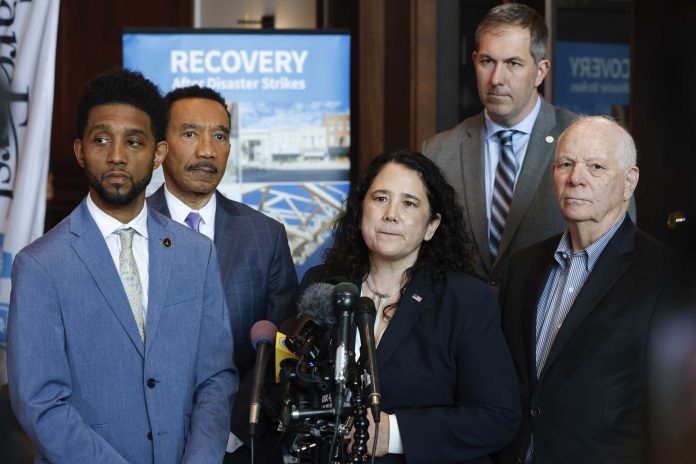
By LEA SKENE
Associated Press
BALTIMORE (AP) — A federal program offering loans to small businesses hurt by the collapse of Baltimore’s Francis Scott Key Bridge has received 500 applications, officials said.
The funds, which could start being distributed within about two weeks, are meant to help keep companies afloat as the city’s vital port remains closed to most maritime traffic, said Isabella Casillas Guzman, who heads the U.S. Small Business Administration. Guzman visited Baltimore on Thursday to meet with business owners, along with local and state leaders.
Businesses involved in transportation and supply chain logistics will likely suffer most in the short term, she said, but the long-term ripple effects will be widespread.
“It’s a full range of impact,” she said following a roundtable discussion at an office in Baltimore that was opened in recent days to assist business owners after the deadly collapse.
Baltimore’s port handles more cars and farm equipment than any other similar facility in the country, and the disaster has created logistical problems up and down the East Coast.
The assistance program offers low-interest loans of up to $2 million.
The Maryland Senate unanimously approved a bill Wednesday night authorizing the governor to use the state’s rainy day fund to help unemployed port employees. That sends the bill to the Maryland House, which could approve the bill this week.
The legislation also would let the governor use state reserves to help some small businesses avoid layoffs and encourage companies that relocate elsewhere to return to Baltimore once the port reopens.
The Norwegian shipping firm Wallenius Wilhelmsen, which has a hub in Baltimore, said it estimates its own losses at between $5 million and $10 million from the port closure. One of its ships is among several currently stuck in Baltimore’s harbor.
The Key Bridge fell March 26 after being struck by the cargo ship Dali, which lost power shortly after leaving Baltimore, bound for Sri Lanka. The ship issued a mayday alert with just enough time for police to stop traffic, but not enough to save a roadwork crew filling potholes on the bridge.
Authorities believe six of the workers plunged to their deaths in the collapse, including two whose bodies were recovered last week. Two others survived. The ship remains stationary, its 21 crew members still aboard.
President Joe Biden is expected to visit the collapse site Friday and meet with relatives of the victims.
White House press secretary Karine Jean-Pierre said Biden will also receive an operational update from U.S. Coast Guard and Army Corps of Engineers officials working to reopen Baltimore’s port “as soon as humanly possible.”
Crews are working to clear the steel wreckage and recover the remaining bodies, something made even more difficult by bad weather this week. They have opened two temporary channels meant primarily for vessels involved in the cleanup. A third channel for larger vessels is in the works.
A visit to the site by Coast Guard boat on Wednesday revealed a close-up view of the devastation, including twisted steel girders and other bridge debris jutting from the water, along with crushed metal shipping containers dangling perilously from the ship.
Divers are still trying to get a sense of what lies beneath the surface. Sonar is being used to map the wreckage on the Patapsco River bottom in 50 feet (15 meters) of water. A large floating crane is helping with the salvage.
But the water is so murky that salvage divers can’t see more than one to two feet in front of them, Gov. Wes Moore said at a news conference Thursday afternoon. Each diver is now paired with an operator who uses three-dimensional drawings and other tools to guide them in a “buddy system,” he said.
U.S. Coast Guard Rear Admiral Shannon Gilreath said there are seven commercial vessels still stuck in the port, each with their crews on board. The ships will not be able to leave until officials are able to open up a temporary channel deep enough for them to get out.


















